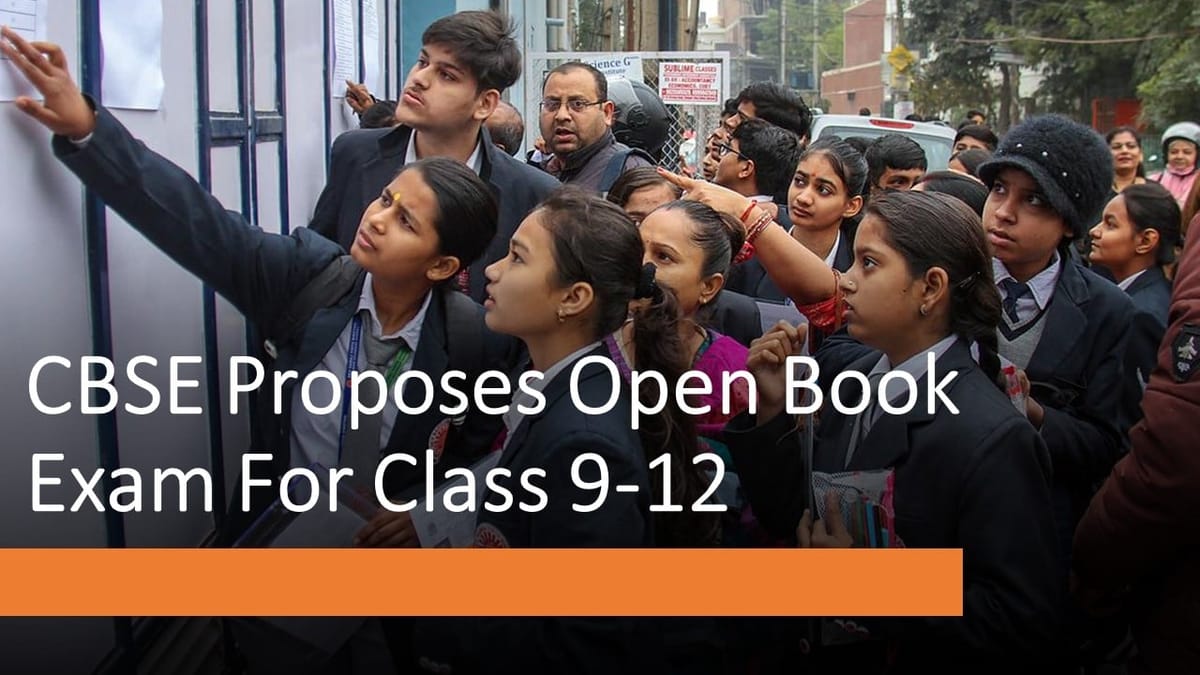CBSE Proposes Open Book Exam for Class 9th to 12th – Boon or Bane for Students?
According to recent reports, students enrolled in the CBSE board’s secondary and senior secondary programs may soon be permitted to bring study materials and textbooks into the test room. Teachers, parents, and students are all having a lot of heated conversations about this planned open-book exam (OBE) style. Supporters praise it for being a positive step toward application-based learning, while detractors worry about possible negative effects like rote memorization and cheating.
Table of Content
- Key Points in the Proposal:
- The Implementation of the Open Book Exam Model:
- Arguments for Open-Book Exams:
- Arguments against exams open-book:
- Possible Benefits and Drawbacks
- The Path Ahead:
Key Points in the Proposal:
- Students in Senior Secondary and Secondary School (Classes 9–12): These classes would serve as the initial test run for the new format.
- Access to Books and Materials: Throughout the exam, students are permitted to consult their textbooks, notes, and other study materials.
- Importance on Application: Rather than just testing students’ memorization of facts, the exam questions would evaluate their capacity for analysis, application, and interpretation of material.
The Implementation of the Open Book Exam Model:
According to the announcement, schools associated with the CBSE are free to hold open-book exams at their discretion without any legal requirements. Examinees get unrestricted access to their study materials, including resource books, notes, and textbooks.
However, they will not be allowed to utilize any digital devices or the internet for acquiring information. Answer sheets will be created in such a way that they have more analytical and application issues that call for conceptual comprehension as opposed to memorization.
Arguments for Open-Book Exams:
- Encourages critical thinking and problem-solving skills: Students are able to investigate various viewpoints and go deeper into challenging subjects.
- Minimizes exam anxiety and rote memorization: Memorizing facts becomes less important than comprehending and using what is learned.
- Promotes self-directed learning and research abilities: Students get knowledge on how to use resources wisely and traverse information efficiently.
- Mirrors real-world scenarios: Similar to the OBE format, many occupations require the instantaneous availability and application of information.
Arguments against exams open-book:
- Possibility of cheating and plagiarism: Students may share answers improperly or take exact quotes from the text without acknowledging them.
- Logistical challenges: Careful preparation and execution are needed to ensure fairness and prevent misuse.
- Teacher bias in question design: There are worries that educators could create questions that favor particular sources or information.
- Unequal access to resources: Students from underprivileged families may not have the means to obtain high-quality study guides, giving them an unfair edge.
Possible Benefits and Drawbacks
This new exam format’s proponents think it will measure competencies that go beyond memorization of information. Students will learn to apply ideas, use different resources, and exhibit greater cognitive ability because solutions won’t be found directly in textbooks. Furthermore, it can lessen test anxiety.
Opponents contend that an open book policy is non-standard and vulnerable to exploitation for malpractices like copying. They believe it is unable to measure basic knowledge and recall capacity objectively. Concerns have also been raised about potential disadvantages for rural pupils who do not have access to sufficient reference materials.
Although novel in concept, how well schools implement CBSE’s open-book test policy will ultimately determine its effectiveness. It can be pioneered as a robust evaluation approach measuring depth of knowledge with careful design and attention to detail.
The Path Ahead:
Currently, the CBSE board is testing the OBE format in a few schools. The new system’s wider rollout will depend on how well these pilots perform. Before a full-fledged deployment, it is imperative to eliminate any downsides and guarantee an even playing field for all pupils.
StudyCafe Membership
Join StudyCafe Membership. For More details about Membership Click Join Membership Button
Join MembershipIn case of any Doubt regarding Membership you can mail us at [email protected]
Join Studycafe's WhatsApp Group or Telegram Channel for Latest Updates on Government Job, Sarkari Naukri, Private Jobs, Income Tax, GST, Companies Act, Judgements and CA, CS, ICWA, and MUCH MORE!"
Author Bio
Naman: Having worked in the field of writing and editing for more than 2.5 years, Naman has established himself as a skilled content writer. His experience is diverse and includes everything from interesting web stories to research-based articles and educational resources. His talents also include YouTube anchoring, where he provides clarity on a range of career-related subjects. Naman's varied resume in the fields of education and recruitment speaks to his adaptability and love of telling gripping stories.
My Recent Articles
CBI Recruitment 2024: New Job Appliciation Out, Check Post, Qualification, Tenure and Other Vital Details
NMRC Recruitment 2024: New Application Out for Various Posts, Check Posts, Age Limit, Qualification and Process to Apply
Himachal Pradesh Public Service Commission Recruitment 2024: Monthly Salary Upto 67000, Check Post, Qualification and Process to Apply
CCRH Recruitment 2024: Walk-In-Interview, Check Posts, Qualification, Salary and Other Details
DIC Recruitment 2024: New Application Out, Check Post, Age Limit, Qualification and Application ProcedureView All Posts 